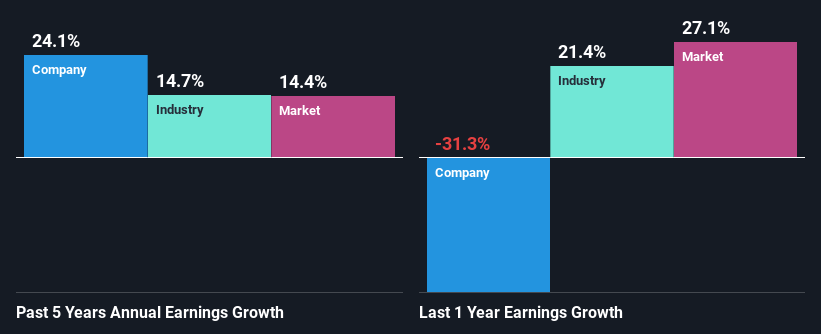PayPal Holdings (NASDAQ:PYPL) has had a rough three months with its share price down 13%. However, a closer look at its sound financials might cause you to think again. Given that fundamentals usually drive long-term market outcomes, the company is worth looking at. Specifically, we decided to study PayPal Holdings’ ROE in this article.
Return on Equity or ROE is a test of how effectively a company is growing its value and managing investors’ money. Simply put, it is used to assess the profitability of a company in relation to its equity capital.
View our latest analysis for PayPal Holdings
How To Calculate Return On Equity?
ROE can be calculated by using the formula:
Return on Equity = Net Profit (from continuing operations) ÷ Shareholders’ Equity
So, based on the above formula, the ROE for PayPal Holdings is:
17% = US$3.6b ÷ US$21b (Based on the trailing twelve months to March 2022).
The ‘return’ is the amount earned after tax over the last twelve months. So, this means that for every $1 of its shareholder’s investments, the company generates a profit of $0.17.
What Has ROE Got To Do With Earnings Growth?
We have already established that ROE serves as an efficient profit-generating gauge for a company’s future earnings. Based on how much of its profits the company chooses to reinvest or “retain”, we are then able to evaluate a company’s future ability to generate profits. Generally speaking, other things being equal, firms with a high return on equity and profit retention, have a higher growth rate than firms that don’t share these attributes.
A Side By Side comparison of PayPal Holdings’ Earnings Growth And 17% ROE
To begin with, PayPal Holdings seems to have a respectable ROE. Further, the company’s ROE is similar to the industry average of 17%. This certainly adds some context to PayPal Holdings’ exceptional 24% net income growth seen over the past five years. We believe that there might also be other aspects that are positively influencing the company’s earnings growth. For example, it is possible that the company’s management has made some good strategic decisions, or that the company has a low payout ratio.
Next, on comparing with the industry net income growth, we found that PayPal Holdings’ growth is quite high when compared to the industry average growth of 15% in the same period, which is great to see.
Earnings growth is a huge factor in stock valuation. What investors need to determine next is if the expected earnings growth, or the lack of it, is already built into the share price. Doing so will help them establish if the stock’s future looks promising or ominous. What is PYPL worth today? The intrinsic value infographic in our free research report helps visualize whether PYPL is currently mispriced by the market.
Is PayPal Holdings Efficiently Re-investing Its Profits?
PayPal Holdings doesn’t pay any dividend to its shareholders, meaning that the company has been reinvesting all of its profits into the business. This is likely what’s driving the high earnings growth number discussed above.
Summary
On the whole, we feel that PayPal Holdings’ performance has been quite good. Particularly, we like that the company is reinvesting heavily into its business, and at a high rate of return. Unsurprisingly, this has led to an impressive earnings growth. We also studied the latest analyst forecasts and found that the company’s earnings growth is expected be similar to its current growth rate. To know more about the latest analysts predictions for the company, check out this visualization of analyst forecasts for the company.
Have feedback on this article? Concerned about the content? Get in touch with us directly. Alternatively, email editorial-team (at) simplywallst.com.
This article by Simply Wall St is general in nature. We provide commentary based on historical data and analyst forecasts only using an unbiased methodology and our articles are not intended to be financial advice. It does not constitute a recommendation to buy or sell any stock, and does not take account of your objectives, or your financial situation. We aim to bring you long-term focused analysis driven by fundamental data. Note that our analysis may not factor in the latest price-sensitive company announcements or qualitative material. Simply Wall St has no position in any stocks mentioned.












Add Comment